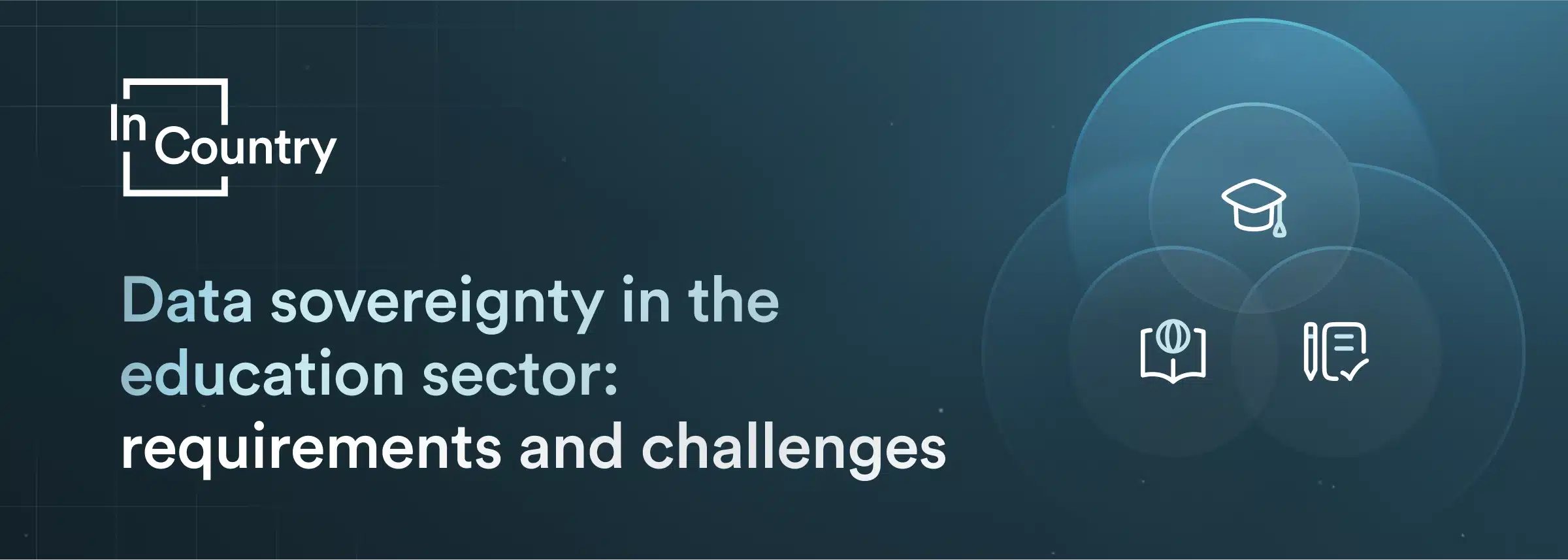Educators are embracing digital transformation, and data sovereignty has emerged as a critical issue for institutions that manage sensitive student information. Data sovereignty refers to the concept that data is subject to the laws and governance structures within the nation it is collected. For educational institutions operating across borders or leveraging international cloud services, navigating data sovereignty is both a regulatory and operational challenge.
What is data sovereignty and why does it matter in education?
Data sovereignty ensures that data, particularly personal and sensitive data remains under the control of the jurisdiction where it is collected. In education, this includes student records, academic performance, health details, and behavioral data. With the rapid adoption of cloud platforms and remote learning tools, schools and universities are increasingly storing and processing student data outside of their home countries.
This global flow of data raises privacy and compliance concerns. Institutions must understand who controls the data, where it resides, and what laws apply. For instance, student data stored on U.S. based servers may be subject to U.S. surveillance laws, even if the students are located elsewhere. This is why data sovereignty has become an essential pillar of digital trust in education.
Legal requirements driving data sovereignty in education
Several national and regional regulations mandate strict controls over educational data:
- GDPR (EU): Requires that personal data, including student information, is processed within the EU or in countries with adequate protection. It also mandates transparency in data processing, data minimization, and robust consent mechanisms. Educational institutions must also ensure data subjects (students, parents) have the right to access, rectify, and erase their data. Failure to comply can result in severe financial penalties.
- FERPA (U.S.): The Family Educational Rights and Privacy Act protects the privacy of student education records. It gives parents (and eligible students) rights to access and correct records and mandates written consent before disclosing personally identifiable information to third parties. FERPA applies to all schools receiving funding from the U.S. Department of Education and places a strong emphasis on access controls and recordkeeping of disclosures.
- PDPA (Singapore), LGPD (Brazil), and others: These laws impose strict consent requirements and, in some cases, mandate data localization. The PDPA requires organizations, including educational institutions, to obtain clear consent before collecting and using personal data, and to ensure data is protected against unauthorized access or disclosure. The LGPD has similar principles to GDPR, including lawful processing, transparency, and data subject rights. Both emphasize the necessity of having a lawful basis for processing student data and enforce penalties for non-compliance.
Institutions must assess their compliance obligations across jurisdictions, especially when collaborating with international campuses, third-party platforms, or cloud vendors.
Key challenges for educational institutions
Implementing data sovereignty measures in education presents several challenges:
- Cross-border data transfer restrictions: Universities operating globally must navigate complex rules about moving student data between countries. These rules can vary widely, from strict prohibitions on transferring data outside national borders to conditional approvals based on contractual safeguards or regulatory authorizations. Navigating these differences requires legal expertise and constant monitoring of evolving laws.
- Cloud infrastructure constraints: Many edtech platforms use international cloud providers whose servers may be located in multiple jurisdictions. While cloud services provide scalability and accessibility, they may not offer the geographic control needed to ensure compliance with local sovereignty laws. Institutions often lack visibility into where data is processed or stored within distributed cloud environments, complicating risk assessments.
- Operational complexity: Ensuring all departments and systems comply with localization requirements adds significant overhead. Administrative, academic, and IT teams must coordinate efforts to maintain jurisdictional boundaries, which often requires updating legacy systems, training staff, and realigning internal processes. Multinational institutions face the added challenge of ensuring policy consistency across geographically dispersed campuses.
- Vendor compliance: Educational institutions must ensure that third-party vendors and learning platforms also adhere to data sovereignty laws. This includes verifying the physical location of data centers, assessing contractual data protection clauses, and confirming that vendors have adequate security and compliance certifications. Institutions may also face liability if their vendors fail to meet legal obligations, increasing the need for due diligence and risk management frameworks. Educational institutions must ensure that third-party vendors and learning platforms also adhere to data sovereignty laws.
These challenges can impact the scalability and flexibility of educational services, making it crucial to develop strategic solutions.
Best practices for compliance and implementation
To comply with data sovereignty regulations, educational institutions should consider the following best practices:
- Adopt data localization: Store sensitive student data within the country of origin whenever required by law.
- Perform regular audits: Review data flows, processing locations, and access permissions to ensure compliance.
- Choose compliant vendors: Partner with cloud and edtech providers that offer regional data hosting and clear compliance guarantees.
- Implement privacy-by-design: Integrate privacy and sovereignty considerations into every system and service.
- Train staff and students: Educate all stakeholders about their roles in protecting and managing data responsibly.
Proactively addressing these areas helps institutions avoid penalties, build trust, and maintain operational continuity.
Preparing for the future of data sovereignty in education
As data becomes more valuable and regulated, educational institutions must prioritize data sovereignty. This is not just a legal requirement, it is a responsibility to students, faculty, and society. Institutions that embrace compliance, invest in secure infrastructure, and establish transparent data governance policies will be better prepared to thrive in an increasingly complex digital education landscape.
Looking forward, harmonization efforts between jurisdictions may reduce complexity, but the need for local control, security, and accountability will remain at the heart of education data management.
How InCountry can help to handle data sovereignty in education
InCountry enables educational institutions to meet strict data residency and data sovereignty requirements by localizing sensitive student, faculty, and operational data in-country without the need to redesign existing platforms or infrastructure. This is particularly valuable for international universities and edtech platforms operating across multiple jurisdictions with varying privacy laws.
